Charles E W Bean, Diaries, AWM38 3DRL 606/264/1 - 1914 - 1938 - Part 12
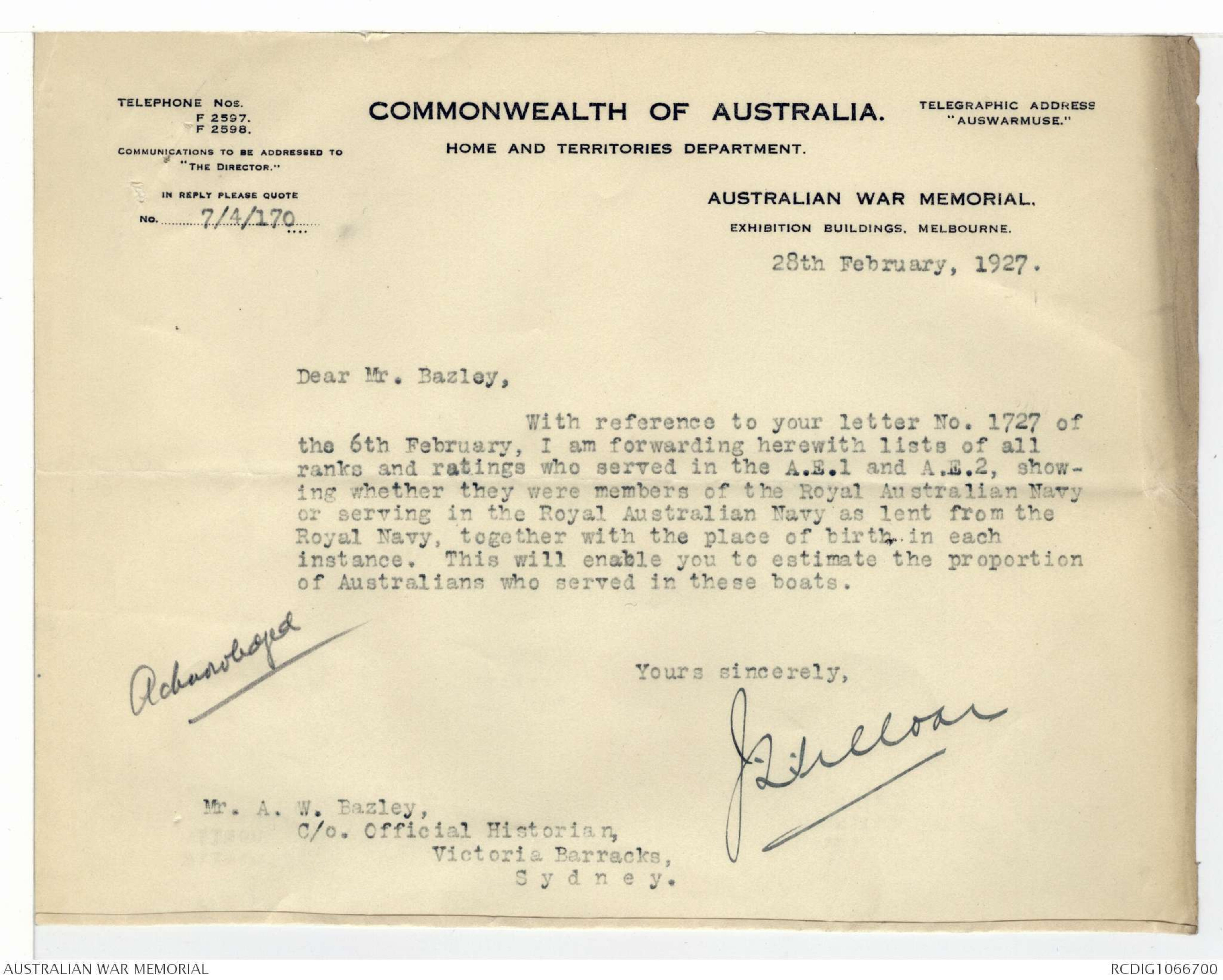
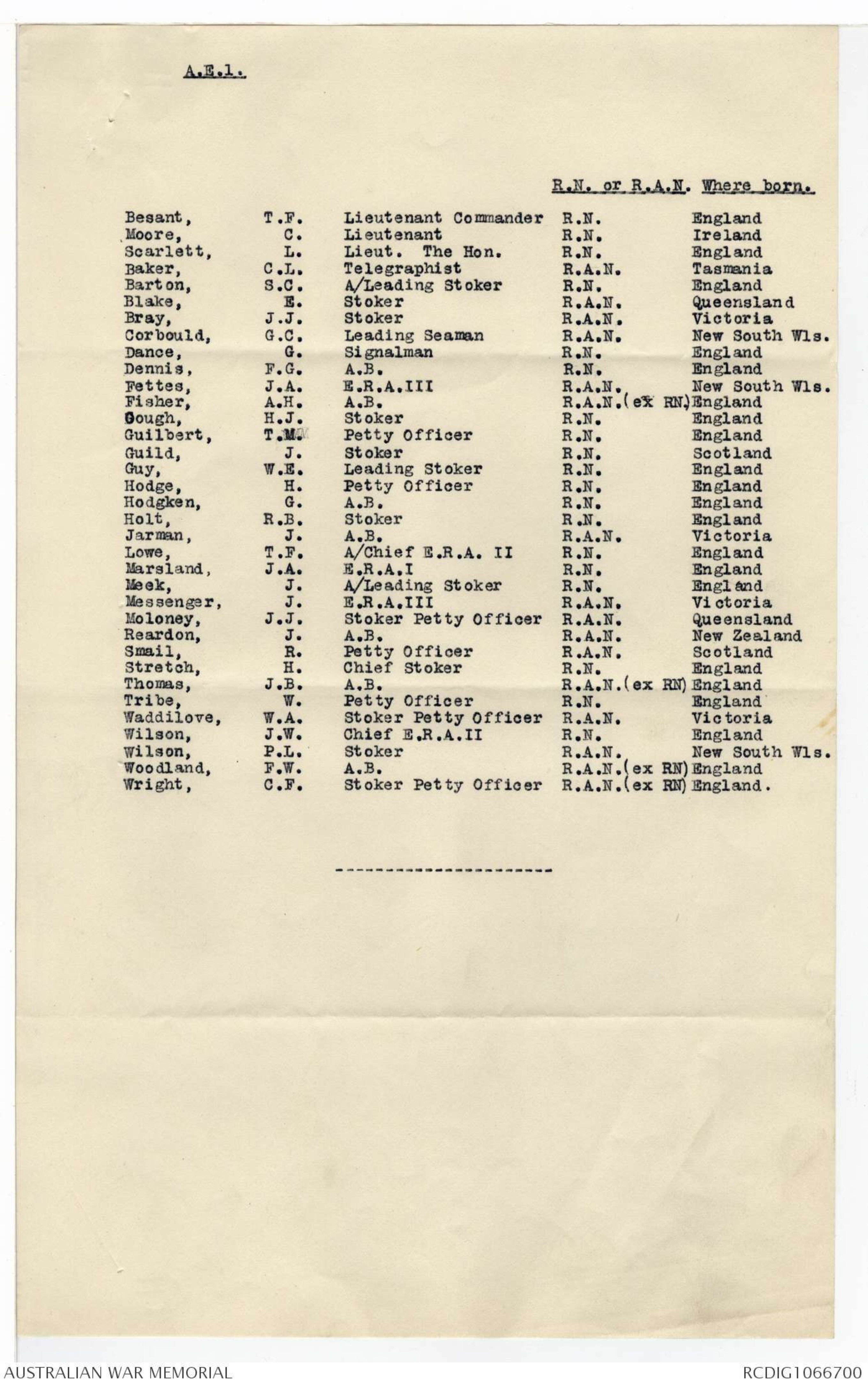
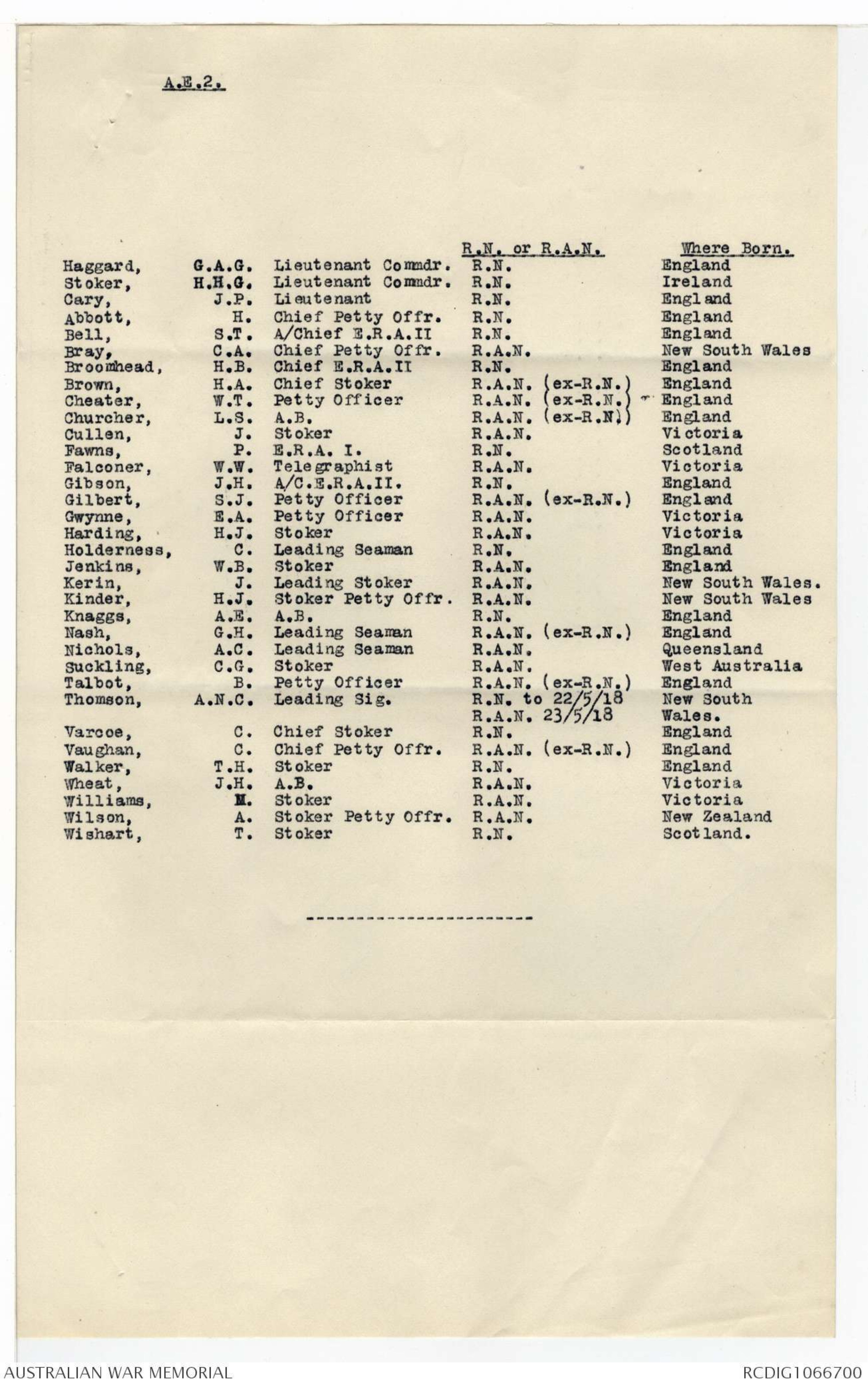
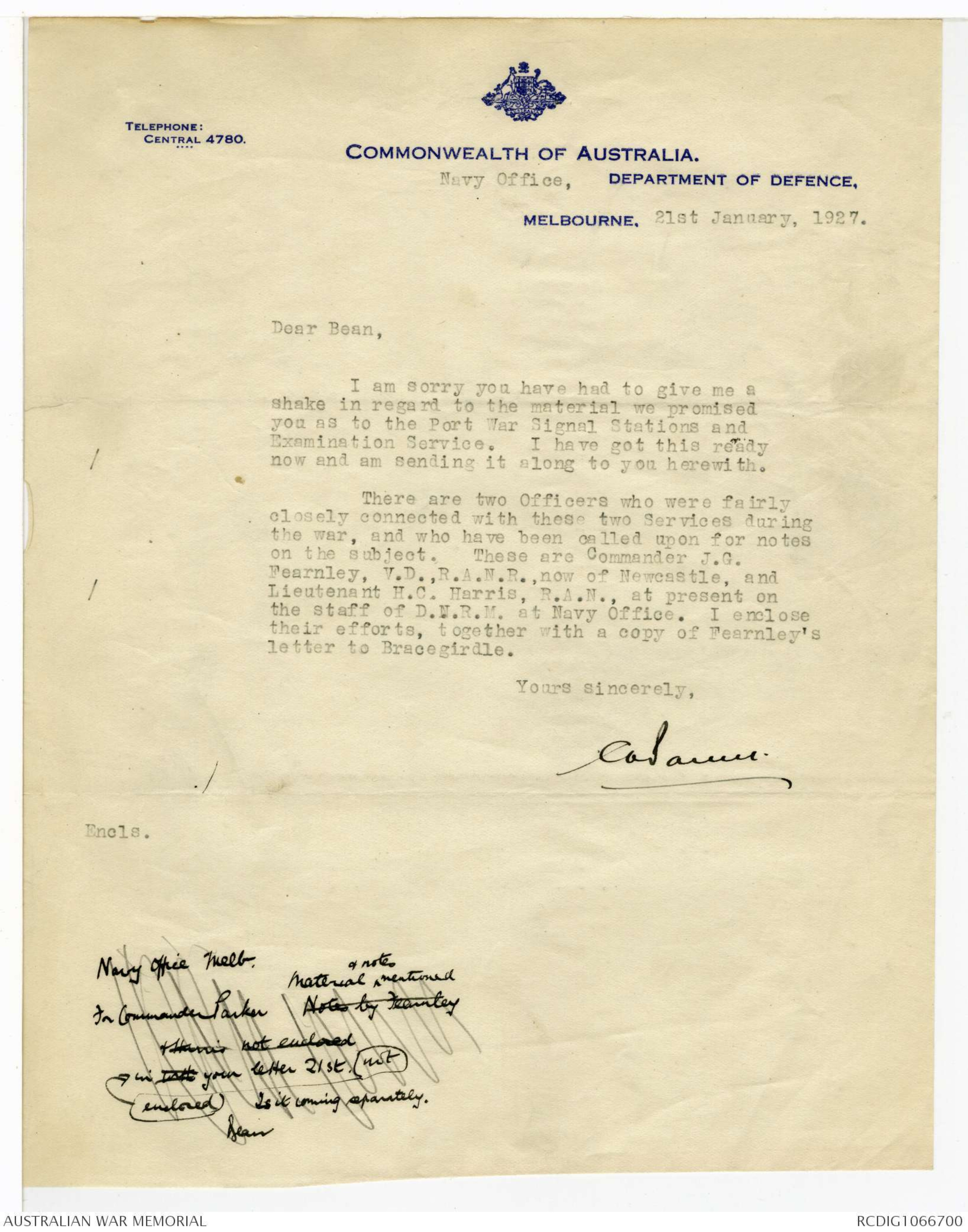
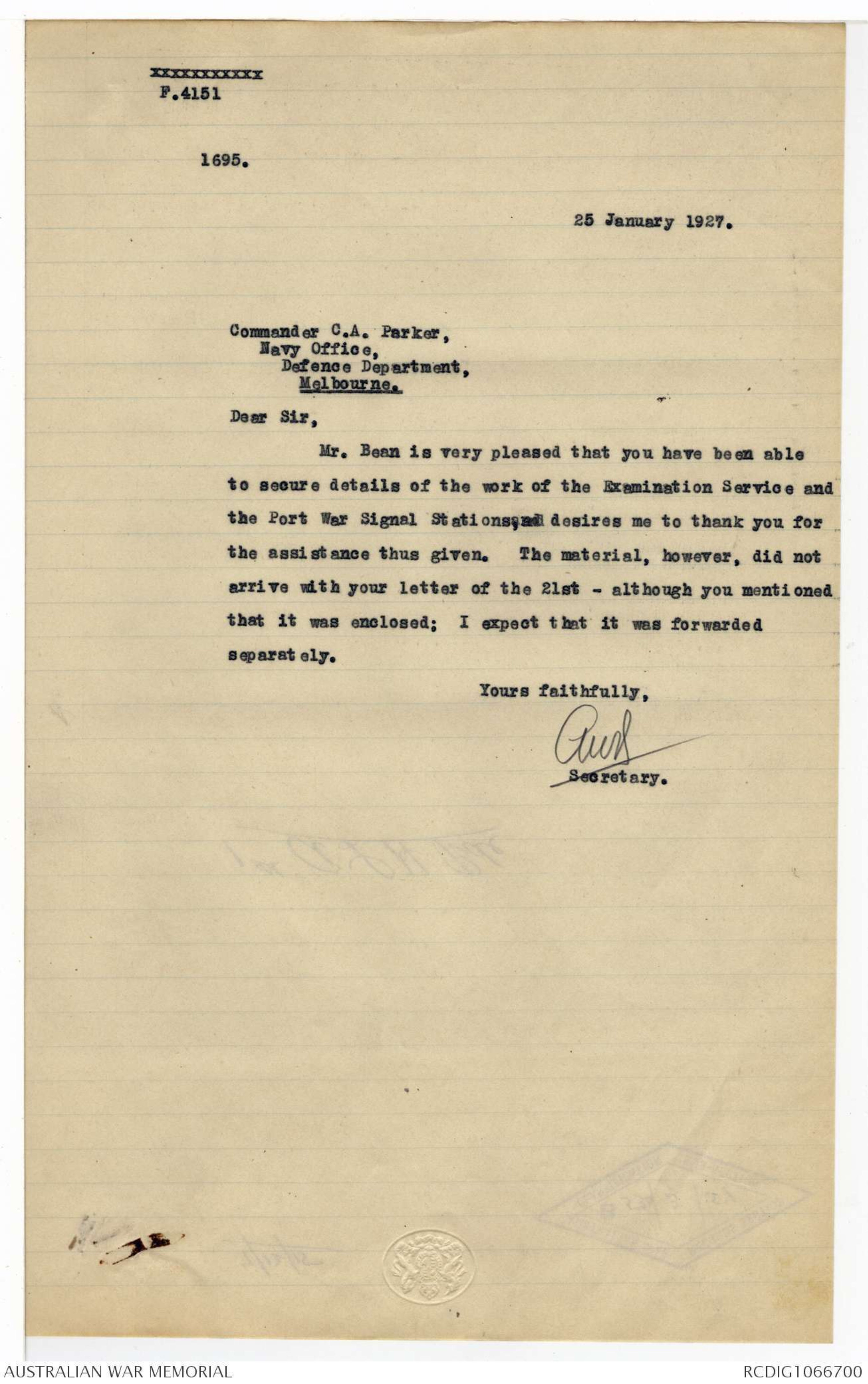
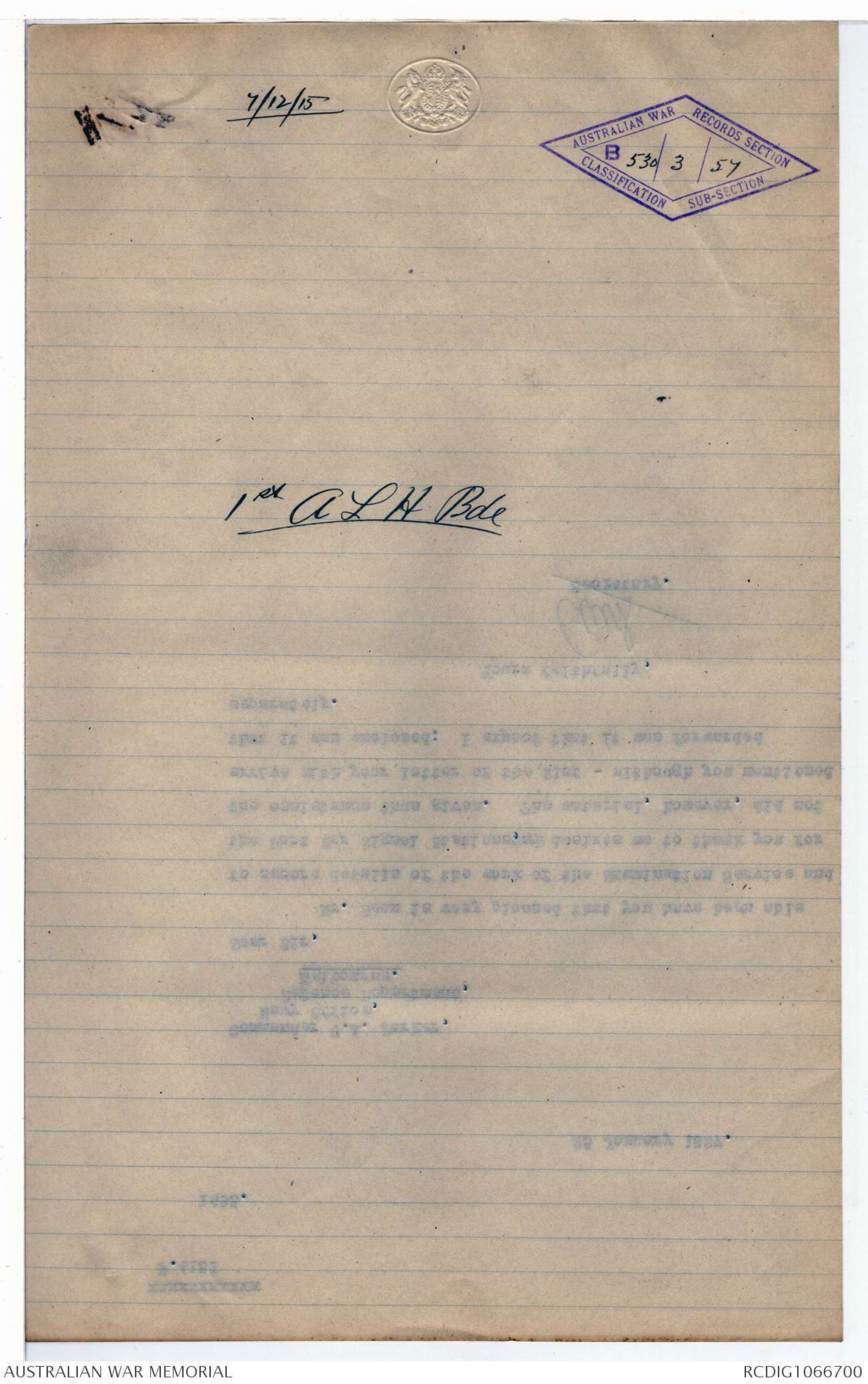
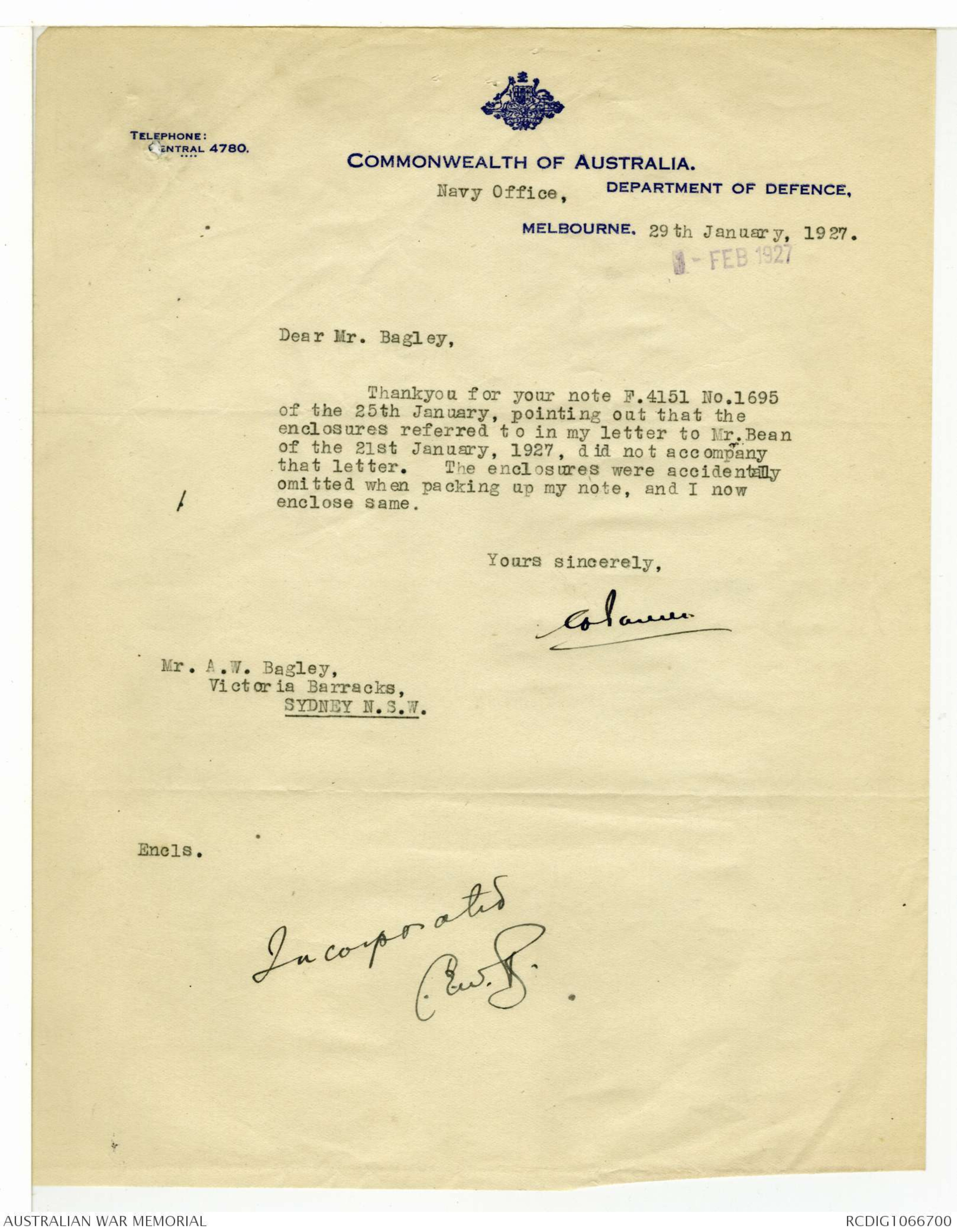
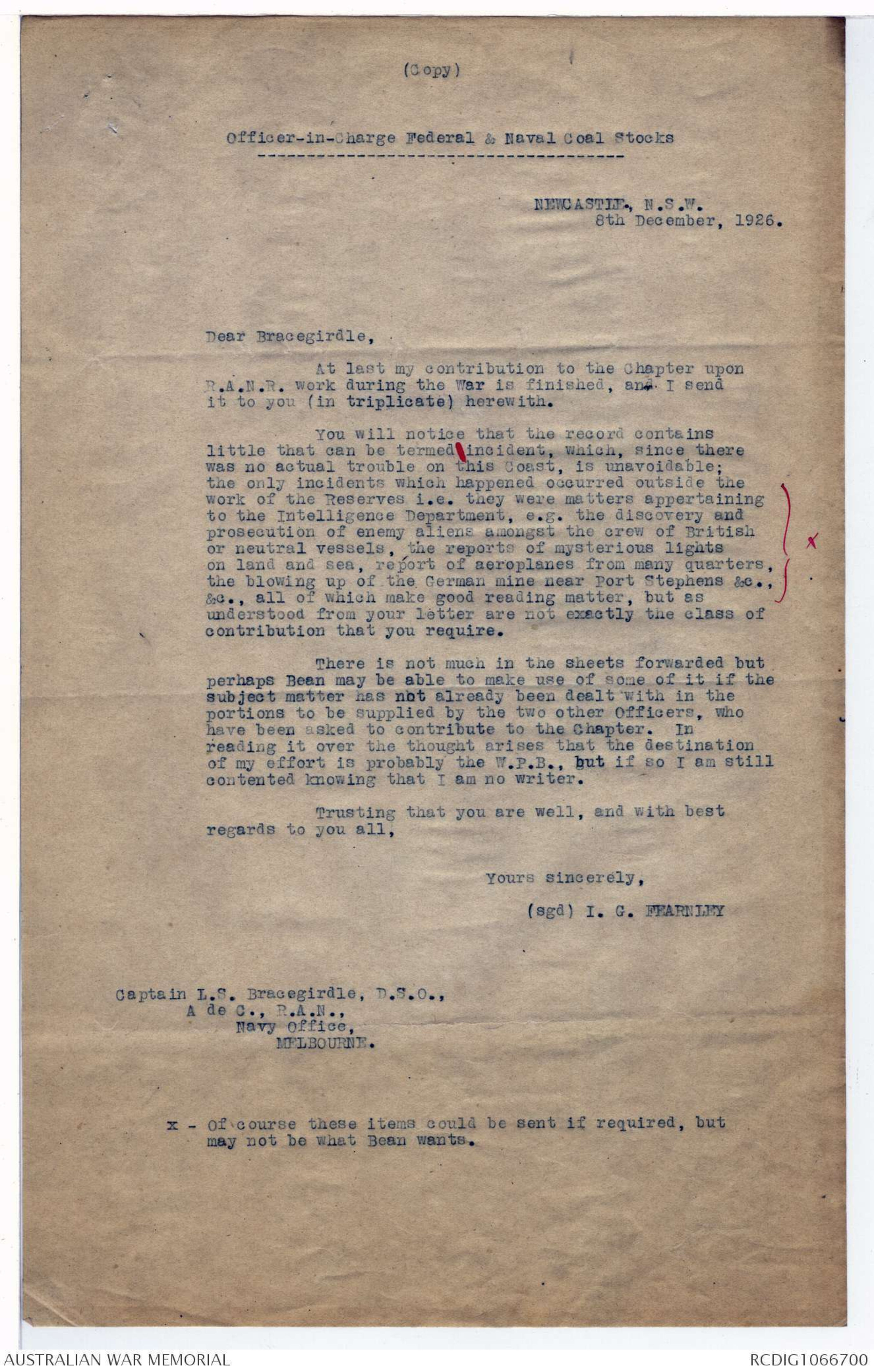
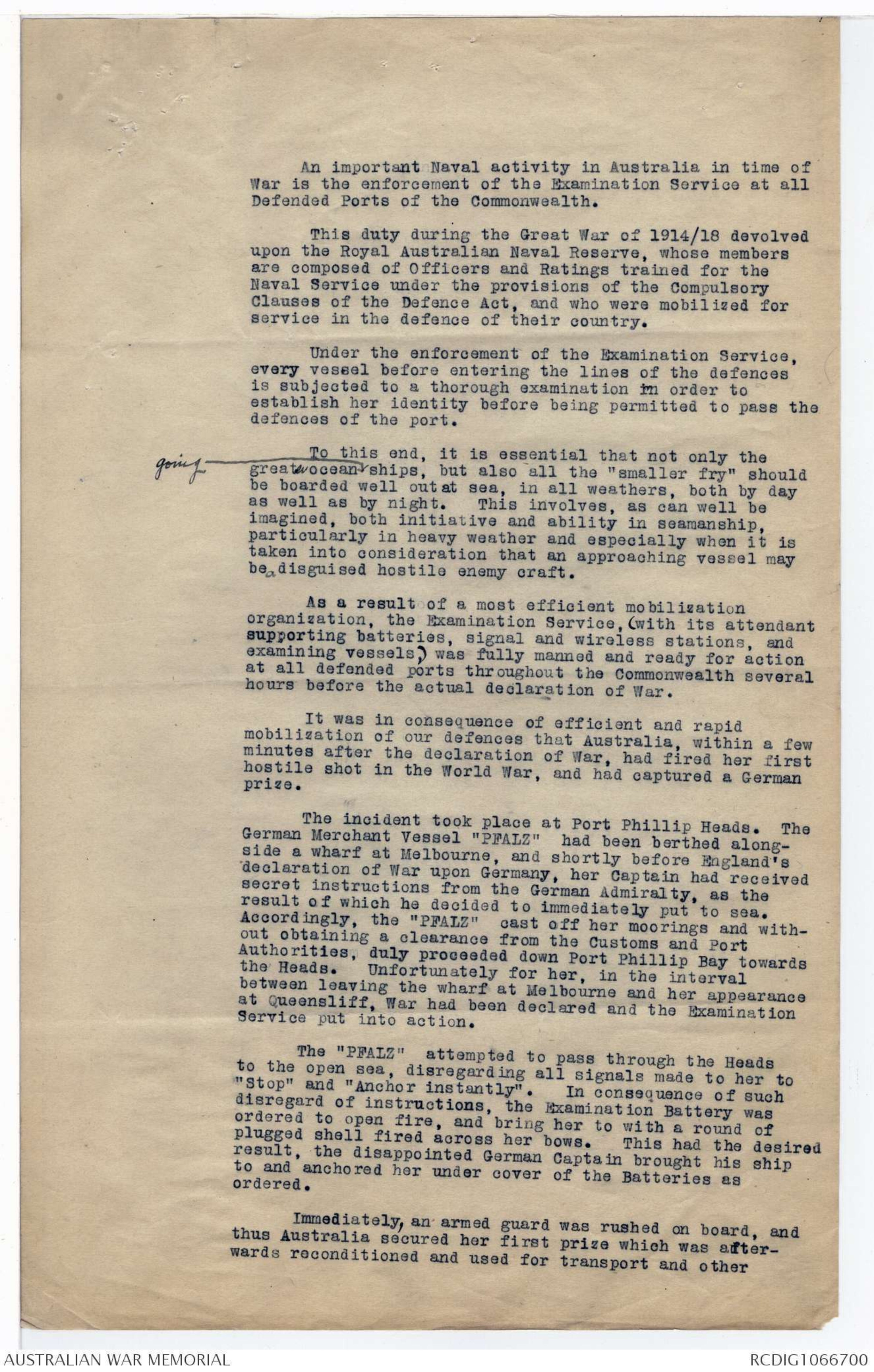
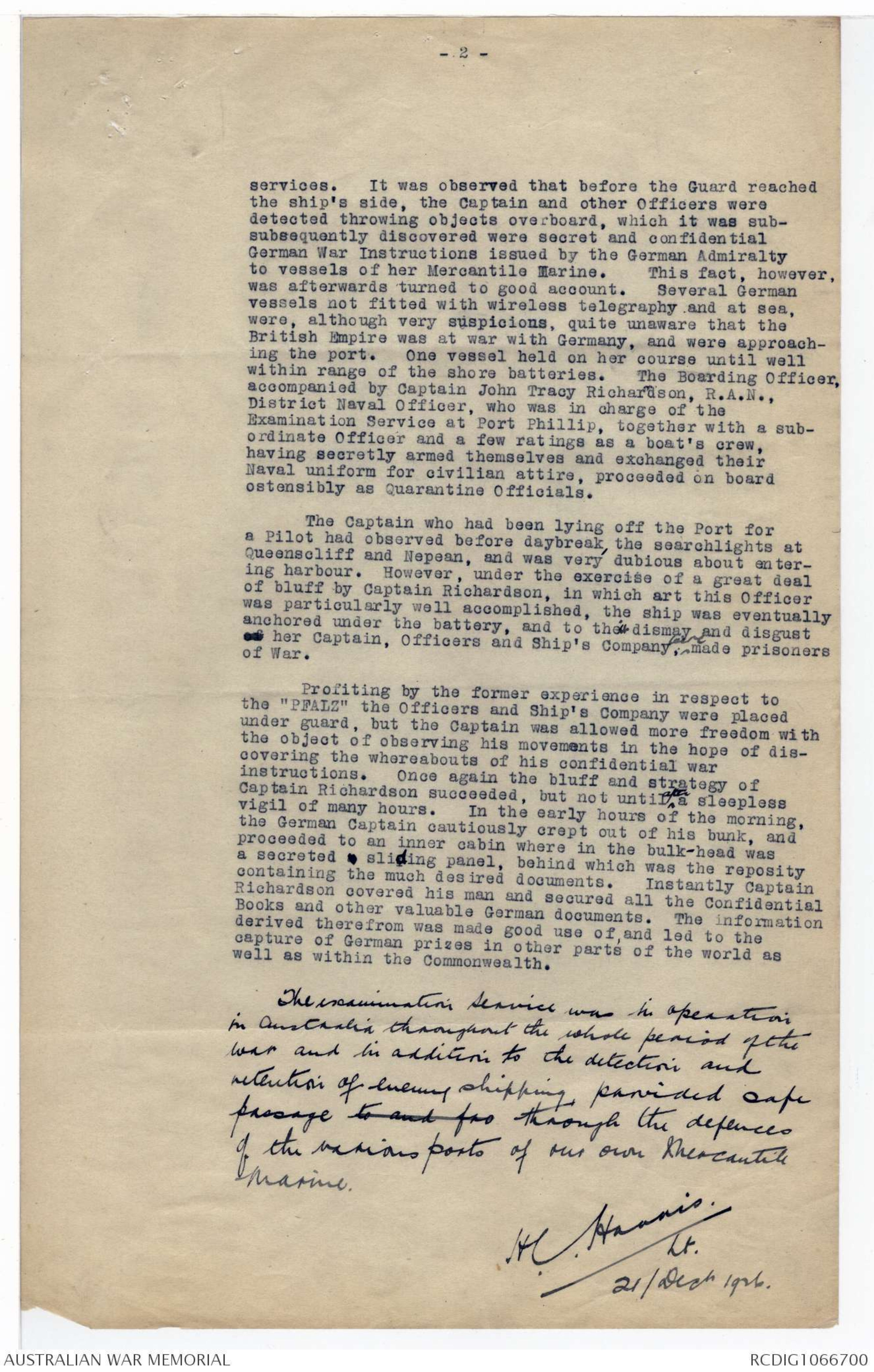
TELEPHONE NOS.
F 2597.
F 2598.
COMMUNICATIONS TO BE ADDRESSED TO
"THE DIRECTOR."
IN REPLY PLEASE QUOTE
NO. 7/4/170
TELEGRAPHIC ADDRESS
"AUSWARMUSE."
COMMONWEALTH OF AUSTRALIA.
HOME AND TERRITORIES DEPARTMENT.
AUSTRALIAN WAR MEMORIAL.
EXHIBITION BUILDINGS, MELBOURNE.
28th February, 1927.
Dear Mr. Bazley,
With reference to your letter No. 1727 of
the 6th February, I am forwarding herewith lists of all
ranks and ratings who served in the A.E.1 and A.E.2, showing
whether they were members of the Royal Australian Navy
or serving in the Royal Australian Navy as lent from the
Royal Navy, together with the place of birth in each
instance. This will enable you to estimate the proportion
of Australians who served in these boats.
[*Acknowledged*]
Yours sincerely,
J L Treloar
Mr. A. W. Bazley,
C/o. Official Historian,
Victoria Barracks,
Sydney.
A.E.1.
| R.N. or R.A.N. | Where born. | |||
| Besant, | T.F. | Lieutenant Commander | R.N. | England |
| Moore, | C. | Lieutenant | R.N. | Ireland |
| Scarlett, | L. | Lieut. The Hon. | R.N. | England |
| Baker, | C.L. | Telegraphist | R.A.N. | Tasmania |
| Barton, | S.C. | A/Leading Stoker | R.N. | England |
| Blake, | E. | Stoker | R.A.N. | Queensland |
| Bray, | J.J. | Stoker | R.A.N. | Victoria |
| Corbould, | G.C. | Leading Seaman | R.A.N. | New South Wls. |
| Dance, | G. | Signalman | R.N. | England |
| Dennis, | F.G. | A.B. | R.N. | England |
| Fettes, | J.A. | E.R.A.III | R.A.N. | New South Wls. |
| Fisher, | A.H. | A.B. | R.A.N. (ex RN.) | England |
| Gough, | H.J. | Stoker | R.N. | England |
| Guilbert, | T.M. | Petty Officer | R.N. | England |
| Guild, | J. | Stoker | R.N. | Scotland |
| Guy, | W.E. | Leading Stoker | R.N. | England |
| Hodge, | H. | Petty Officer | R.N. | England |
| Hodgken, | G. | A.B. | R.N. | England |
| Holt, | R.B. | Stoker | R.N. | England |
| Jarman, | J. | A.B. | R.A.N. | Victoria |
| Lowe, | T.F. | A/Chief E.R.A. II | R.N. | England |
| Marsland, | J.A. | E.R.A.I | R.N. | England |
| Meek, | J. | A/Leading Stoker | R.N. | England |
| Messenger, | J. | E.R.A.III | R.A.N. | Victoria |
| Moloney, | J.J. | Stoker Petty Officer | R.A.N. | Queensland |
| Reardon, | J. | A.B. | R.A.N. | New Zealand |
| Smail, | R. | Petty Officer | R.A.N. | Scotland |
| Stretch, | H. | Chief Stoker | R.N. | England |
| Thomas, | J.B. | A.B. | R.A.N. (ex RN) | England |
| Tribe, | W. | Petty Officer | R.N. | England |
| Waddilove, | W.A. | Stoker Petty Officer | R.A.N. | Victoria |
| Wilson, | J.W. | Chief E.R.A.II | R.N. | England |
| Wilson, | P.L. | Stoker | R.A.N. | New South Wls. |
| Woodland, | F.W. | A.B. | R.A.N. (ex RN) | England |
| Wright, | C.F. | Stoker Petty Officer | R.A.N. (ex RN) | England. |
A.E.2.
| R.N. or R.A.N. | Where born. | |||
| Haggard, | G.A.G. | Lieutenant Commdr. | R.N. | England |
| Stoker, | H.H.G. | Lieutenant Commdr. | R.N. | Ireland |
| Cary, | J.P. | Lieutenant | R.N. | England |
| Abbott, | H. | Chief Petty Offr. | R.N. | England |
| Bell, | S.T. | A/Chief E.R.A.II | R.N. | England |
| Bray, | C.A. | Chief Petty Offr. | R.A.N. | New South Wales |
| Broomhead, | H.B. | Chief E.R.A.II | R.N. | England |
| Brown, | H.A. | Chief Stoker | R.A.N. (ex-R.N.) | England |
| Cheater, | W.T. | Petty Officer | R.A.N. (ex-R.N.) | England |
| Churcher, | L.S. | A.B. | R.A.N. (ex-R.N.) | England |
| Cullen, | J. | Stoker | R.A.N. | Victoria |
| Fawns, | P. | E.R.A. I. | R.N. | Scotland |
| Falconer, | W.W. | Telegraphist | R.A.N. | Victoria |
| Gibson, | J.H. | A/C.E.R.A.II. | R.N. | England |
| Gilbert, | S.J. | Petty Officer | R.A.N. (ex-R.N.) | England |
| Gwynne, | E.A. | Petty Officer | R.A.N. | Victoria |
| Harding, | H.J. | Stoker | R.A.N. | Victoria |
| Holderness, | C. | Leading Seaman | R.N. | England |
| Jenkins, | W.B. | Stoker | R.A.N. | England |
| Kerin, | J. | Leading Stoker | R.A.N. | New South Wales. |
| Kinder, | H.J. | Stoker Petty Offr. | R.A.N. | New South Wales |
| Knaggs, | A.E. | A.B. | R.N. | England |
| Nash, | G.H. | Leading Seaman | R.A.N. (ex-R.N.) | England |
| Nichols, | A.C. | Leading Seaman | R.A.N. | Queensland |
| Suckling, | C.G. | Stoker | R.A.N. | West Australia |
| Talbot, | B. | Petty Officer | R.A.N. (ex-R.N.) | England |
| Thomson, | A.N.C. | Leading Sig. | R.N. to 22/5/18 | New South |
| R.A.N. 23/5/18 | Wales. | |||
| Varcoe, | C. | Chief Stoker | R.N. | England |
| Vaughan, | C. | Chief Petty Offr. | R.A.N. (ex-R.N.) | England |
| Walker, | T.H. | Stoker | R.N. | England |
| Wheat, | J.H. | A.B. | R.A.N. | Victoria |
| Williams, | M. | Stoker | R.A.N. | Victoria |
| Wilson, | A. | Stoker Petty Offr. | R.A.N. | New Zealand |
| Wishart, | T. | Stoker | R.N. | Scotland. |
TELEPHONE:
CENTRAL 4780.
COMMONWEALTH OF AUSTRALIA.
Navy Office, DEPARTMENT OF DEFENCE,
MELBOURNE. 21st January, 1927.
Dear Bean,
I am sorry you have had to give me a
shake in regard to the material we promised
you as to the Port War Signal Stations and
Examination Service. I have got this ready
now and am sending it along to you herewith.
There are two Officers who were fairly
closely connected with these two Services during
the war, and who have been called upon for notes
on the subject. These are Commander J.G.
Fearnley, V.D., R.A.N.R., now of Newcastle, and
Lieutenant H.C. Harris, R.A.N., at present on
the staff of D.N.R.M. at Navy Office. I enclose
their efforts, together with a copy of Fearnley's
letter to Bracegirdle.
Yours sincerely,
CA James
Encls.Navy Office Melb.Material ^& notes mentionedFor Commander Parker Notes by Fearnley& Harris not enclosedin with your letter 21st notenclosed Is it coming separately.Bean
F.4151
1695.
25 January 1927.
Commander C.A. Parker,
Navy Office,
Defence Department,
Melbourne.
Dear Sir,
Mr. Bean is very pleased that you have been able
to secure details of the work of the Examination Service and
the Port War Signal Stations, and desires me to thank you for
the assistance thus given. The material, however, did not
arrive with your letter of the 21st - although you mentioned
that it was enclosed: I expect that it was forwarded
separately.
Yours faithfully,
A W B
Secretary.
7/12/15
AUSTRALIAN WAR RECORDS SECTION
B 530/3/57
CLASSIFICATION SUB-SECTION
1st A L H Bde
TELEPHONE:
CENTRAL 4780.
COMMONWEALTH OF AUSTRALIA.
Navy Office, DEPARTMENT OF DEFENCE,
MELBOURNE. 29th January, 1927.
3-FEB 1927
Dear Mr. Bagley,
Thankyou for your note F.4151 No.1695
of the 25th January, pointing out that the
enclosures referred to in my letter to Mr. Bean
of the 21st January, 1927, did not accompany
that letter. The enclosures were accidentally
omitted when packing up my note, and I now
enclose same.
Yours sincerely,
CA James
Mr. A.W. Bagley,
Victoria Barracks,
SYDNEY N.S.W.
Encls.
[*Incorporated
C.E.W.B.*]
(Copy)
Officer-in-Charge Federal & Naval Coal Stocks
NEWCASTLE, N.S.W.
8th December, 1926.
Dear Bracegirdle,
At last my contribution to the Chapter upon
R.A.N.R. work during the War is finished, and I send
it to you (in triplicate) herewith.
[*X*]
You will notice that the record contains
little that can be termed incident, which, since there
was no actual trouble on this Coast, is unavoidable;
the only incidents which happened occurred outside the
work of the Reserves i.e. they were matters appertaining
to the Intelligence Department, e.g. the discovery and
prosecution of enemy aliens amongst the crew of British
or neutral vessels, the reports of mysterious lights
on land and sea, report of aeroplanes from many quarters,
the blowing up of the German mine near Port Stephens &c.,
&c., all of which make good reading matter, but as
understood from your letter are not exactly the class of
contribution that you require.
There is not much in the sheets forwarded but
perhaps Bean may be able to make use of some of it if the
subject matter has not already been dealt with in the
portions to be supplied by the two other Officers, who
have been asked to contribute to the Chapter. In
reading it over the thought arises that the destination
of my effort is probably the W.P.B., but if so I am still
contented knowing that I am no writer.
Trusting that you are well, and with best
regards to you all,
Yours sincerely,
(sgd) I. G. FEARNLEY
Captain L.S. Bracegirdle, D.S.O.,
A de C., R.A.N.,
Navy office.
MELBOURNE.
x - Of course these items could be sent if required, but
may not be what Bean wants.
An important Naval activity in Australia in time of
War is the enforcement of the Examination Service at all
Defended Ports of the Commonwealth.
This duty during the Great War of 1914/18 devolved
upon the Royal Australian Naval Reserve, whose members
are composed of Officers and Ratings trained for the
Naval Service under the provisions of the Compulsory
Clauses of the Defence Act, and who were mobilized for
service in the defence of their country.
Under the enforcement of the Examination Service,
every vessel before entering the lines of the defences
is subjected to a thorough examination in order to
establish her identity before being permitted to pass the
defences of the port.
To this end, it is essential that not only the
greater ocean going ships, but also all the "smaller fry" should
be boarded well out at sea, in all weathers, both by day
as well as by night. This involves, as can well be
imagined, both initiative and ability in seamanship,
particularly in heavy weather and especially when it is
taken into consideration that an approaching vessel may
be a disguised hostile enemy craft.
As a result of a most efficient mobilization
organization, the Examination Service, (with its attendant
supporting batteries, signal and wireless stations, and
examining vessels) was fully manned and ready for action
at all defended ports throughout the Commonwealth several
hours before the actual declaration of War.
It was in consequence of efficient and rapid
mobilization of our defences that Australia, within a few
minutes after the declaration of War, had fired her first
hostile shot in the World War, and had captured a German
prize.
The incident took place at Port Phillip Heads. The
German Merchant Vessel "PFALZ" had been berthed alongside
a wharf at Melbourne, and shortly before England's
declaration of War upon Germany, her Captain had received
secret instructions from the German Admiralty, as the
result of which he decided to immediately put to sea.
Accordingly, the "PFALZ" cast off her moorings and without
obtaining a clearance from the Customs and Port
Authorities, duly proceeded down Port Phillip Bay towards
the Heads. Unfortunately for her, in the interval
between leaving the wharf at Melbourne and her appearance
at Queensliff, War had been declared and the Examination
Service put into action.
The "PFALZ", attempted to pass through the Heads
to the open sea, disregarding all signals made to her to
"Stop" and "Anchor instantly". In consequence of such
disregard of instructions, the Examination Battery was
ordered to open fire, and bring her to with a round of
plugged shell fired across her bows. This had the desired
result, the disappointed German Captain brought his ship
to and anchored her under cover of the Batteries as
ordered.
Immediately, an armed guard was rushed on board, and
thus Australia secured her first prize which was afterwards
reconditioned and used for transport and other
- 2 -
services. It was observed that before the Guard reached
the ship's side, the Captain and other Officers were
detected throwing objects overboard, which it was
subsubsequently discovered were secret and confidential
German War Instructions issued by the German Admiralty
to vessels of her Mercantile Marine. This fact, however,
was afterwards turned to good account. Several German
vessels not fitted with wireless telegraphy and at sea,
were, although very suspicions, quite unaware that the
British Empire was at war with Germany, and were approaching
the port. One vessel held on her course until well
within range of the shore batteries. The Boarding Officer,
accompanied by Captain John Tracy Richardson, R.A.N.,
District Naval Officer, who was in charge of the
Examination Service at Port Phillip, together with a subordinate
Officer and a few ratings as a boat's crew,
having secretly armed themselves and exchanged their
Naval uniform for civilian attire, proceeded on board
ostensibly as Quarantine Officials.
The Captain who had been lying off the Port for
a Pilot had observed before daybreak, the searchlights at
Queenscliff and Nepean, and was very dubious about entering
harbour. However, under the exercise of a great deal
of bluff by Captain Richardson, in which art this Officer
was particularly well accomplished, the ship was eventually
anchored under the battery, and to their dismay and disgustof her Captain, Officers and Ship's Company, ^were made prisoners
of War.
Profiting by the former experience in respect to
the "PFALZ" the Officers and Ship's Company were placed
under guard, but the Captain was allowed more freedom with
the object of observing his movements in the hope of discovering
the whereabouts of his confidential war
instructions. Once again the bluff and strategy of
Captain Richardson succeeded, but not until ^after a sleepless
vigil of many hours. In the early hours of the morning,
the German Captain cautiously crept out of his bunk, and
proceeded to an inner cabin where in the bulk-head was
a secreted o sliding panel, behind which was the reposity
containing the much desired documents. Instantly Captain
Richardson covered his man and secured all the Confidential
Books and other valuable German documents. The information
derived there from was made good use of, and led to the
capture of German prizes in other parts of the world as
well as within the Commonwealth.
The examination Service was in operation
in Australia throughout the whole period of the
war and in addition to the detection and
retention of enemy shipping provided safe
passage to and fro through the defences
of the various ports of our own Mercantile
Marine.
H.C. Harris
Lt.
21/ Decr 1926.
 Deb Parkinson
Deb ParkinsonThis transcription item is now locked to you for editing. To release the lock either Save your changes or Cancel.
This lock will be automatically released after 60 minutes of inactivity.